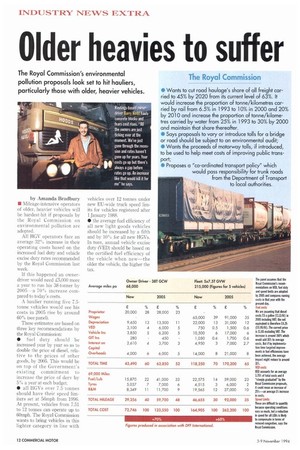Older heavies to suffer
Page 14

If you've noticed an error in this article please click here to report it so we can fix it.
by Amanda Bradbury • Mileage-intensive operators of older, heavier vehicles will be hardest-hit if proposals by the Royal Commission on environmental pollution are adopted, All HGV operators face an average 32% increase in their operating costs based on the increased fuel duty and vehicle excise duty rates recommended by the Royal Commission last week.
If this happened an ownerdriver would need £5,000 more a year to run his 38-tonner by 2005-a 70% increase compared to today's costs.
A haulier running five 7.5tonne vehicles would see his costs in 2005 rise by around 60% (see panel).
These estimates are based on three key recommendations by the Royal Commission: • fuel duty should be increased year by year so as to double the price of diesel, relative to the prices of other goods, by 2005. This would be on top of the Government's existing commitment to increase the price of dery by 5% a year at each budget.
• all EIGVs over 7.5 tonnes should have their speed limiters set at 56mph from 1996. At present, vehicles from 7.51 to 12 tonnes can operate up to 60mph, The Royal Commission wants to bring vehicles in this lighter category in line with
vehicles over 12 tonnes under new EU-wide truck speed limits for vehicles registered after 1 January 1988.
• the average fuel efficiency of all new light goods vehicles should be increased by a fifth and by 10% for all new HGVs. In turn, annual vehicle excise duty (VED) should be based on the certified fuel efficiency of the vehicle when new-the older the vehicle, the higher the tax.
































































































